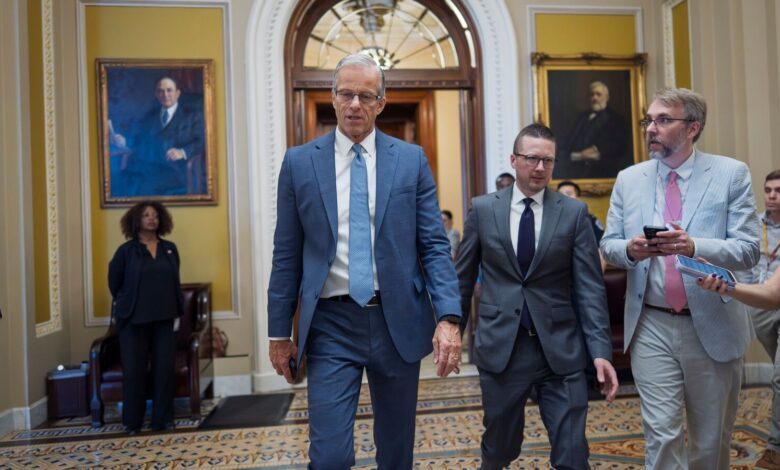Senate gridlocks as GOP scrambles to save Donald Trump’s tax and spending Bill

The Senate ground to a halt on Tuesday morning (July 1) after an all-night voting session on President Donald Trump’s sweeping $3.3 trillion tax and spending package, as Republican leaders scrambled to secure the final votes needed to pass what they call the “One Big Beautiful Bill Act.” Deep divisions within the party and fierce opposition from Democrats have pushed the process into one of the longest amendment marathons in modern Senate history.
Thune: “We’ll see what happens”
Senate Majority Leader John Thune worked through the night to bridge the gap between moderates worried about Medicaid cuts and fiscal hawks demanding deeper reductions. Thune, asked whether the bill would pass, said: “I believe we do [have the votes]. But like I’ve said, I’m of Scandinavian heritage, so I’ve always been a realist—we’ll see what happens.”
Trump: “I don’t like cuts”
President Donald Trump, who has set a July 4 deadline for passage, acknowledged the complexity of the negotiations as he departed for Florida on Tuesday morning: “We’re going to have to see the final version. I don’t want to go too crazy with cuts. I don’t like cuts.”
Still, the president expressed confidence: “I think we’re going to get there. It’s tough. We’re trying to bring it down, bring it down so it’s really good for the country.”
All eyes on Murkowski
Alaska Senator Lisa Murkowski emerged as the pivotal swing vote. She spent hours huddled in negotiations, pushing for protections to Medicaid and food assistance in her state—some of which were ruled out by Senate procedure.
Asked how she’d vote early Tuesday, she told reporters: “The sun is up, I’m going to go have a cup of coffee.”
Collin, Paul and other key holdouts
At one point, Sen. Rand Paul stunned colleagues by emerging from Thune’s office with an offer to trade his opposition for a significantly smaller increase in the debt ceiling—a proposal GOP leaders weighed as the chamber drifted deeper into uncertainty.
Meanwhile, four hard-right Republicans—Rick Scott (Fla.), Mike Lee (Utah), Ron Johnson (Wis.), and Cynthia Lummis (Wyo.)—demanded even sharper spending cuts. They filed into Thune’s office for a late-night meeting that stretched past midnight.
With Republicans holding a narrow 53-47 majority, Thune can afford to lose no more than three votes. Two senators—Rand Paul of Kentucky and Thom Tillis of North Carolina—have already declared their opposition, leaving the bill’s fate in the hands of a few pivotal moderates.
Sen. Susan Collins (R-Maine), another crucial swing vote, also remained noncommittal, saying she had “a lot of serious reservations about the bill.”
Senator Rand Paul of Kentucky, a staunch fiscal conservative, offered a last-minute deal involving a smaller increase to the debt ceiling, but has remained opposed.
Senator Thom Tillis of North Carolina has also signaled his “no” vote, citing concerns about millions losing Medicaid coverage.
A night of friction and fatigue
What began as a standard vote-a-rama spiraled into a 24-hour legislative slog. More than three dozen amendments were processed in a chamber that was often dead silent on the surface but in crisis behind the scenes.
Senator Joni Ernst of Iowa, who was seen carrying donuts through the Capitol, lamented the loss of her own amendment to soften green energy cuts: “I don’t think they’re going to let us bring it up,” she said. “There’s a lot of stuff that went on overnight that kind of waylaid a lot of our plans.”
Democrats slam “magic math”
Senate Democrats worked to slow momentum by dragging out the debate and reading sections of the bill aloud over the weekend.
Senate Democratic Leader Chuck Schumer declared: “Republicans are in shambles because they know the bill is so unpopular.”
Sen. Patty Murray (D-Wash.) denounced the GOP’s budget math: “This kind of magic math won’t fly with Americans trying to balance their own household books.”
What’s in the Bill?
According to the Congressional Budget Office, the tax and spending bill would:
- Make permanent Trump’s 2017 tax cuts and add new reductions—including no taxes on tips—at a total cost of $4.5 trillion.
- Slash $1.2 trillion in Medicaid and food stamp spending by tightening work requirements and reducing eligibility.
- Cut billions in clean energy tax credits—changes Democrats warned would devastate wind and solar projects nationwide.
- Allocate $350 billion to border enforcement and deportations, partly funded by new fees on immigrants.
- The CBO projected 11.8 million more Americans would become uninsured by 2034, and the deficit would grow by nearly $3.3 trillion over the decade.
- $4.5 trillion in tax cuts, making Trump’s 2017 tax rates permanent
- $1.2 trillion in cuts to Medicaid and food stamps, via work requirements and tighter eligibility
- A $350 billion boost in border and national security spending
- Elimination of key green energy tax credits
- New excise taxes on solar and wind equipment from China and other “foreign entities of concern”
- According to the Congressional Budget Office, the bill would: Increase the deficit by $3.3 trillion over 10 years
- Leave 11.8 million more Americans uninsured by 2034
Final countdown
Treasury Secretary Scott Bessent said on Fox News that the bill is on track for Senate approval by Tuesday afternoon. Republican aides were seen huddling with the Senate parliamentarian Tuesday morning, drafting a “wraparound amendment” to clean up the legislation for final passage and increase its chances in the House.
House Speaker Mike Johnson has warned that the Senate bill could face turbulence in the House, particularly over Medicaid cuts and state-and-local tax deduction compromises. One GOP House member, Rep. Nick LaLota of New York, has already pledged to vote no.






